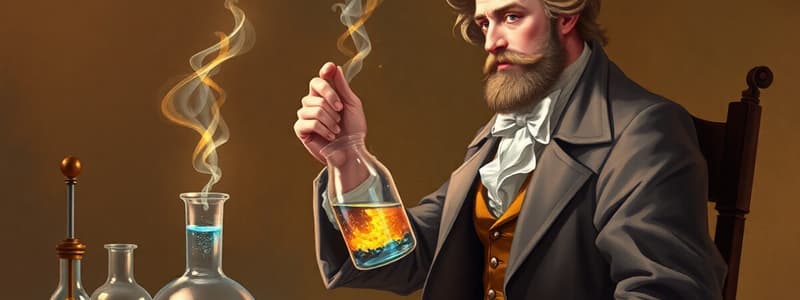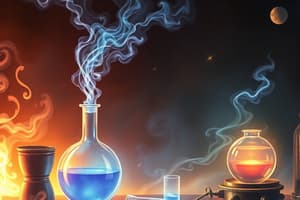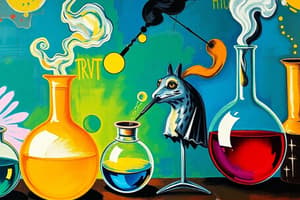Podcast
Questions and Answers
What should you commit to when learning chemistry?
What should you commit to when learning chemistry?
- Competition
- Improvement (correct)
- Memorization
- Perfection
What kind of thinking is emphasized when learning chemistry?
What kind of thinking is emphasized when learning chemistry?
- Rote thinking
- Critical thinking
- Conceptual thinking (correct)
- Linear thinking
What should learners utilize in a positive manner to improve?
What should learners utilize in a positive manner to improve?
- Criticism
- Assumptions
- Doubt
- Feedback (correct)
Which of the following could help improve learning skills?
Which of the following could help improve learning skills?
What is an important part of the Scientific method?
What is an important part of the Scientific method?
What is the primary focus of chemistry as a science?
What is the primary focus of chemistry as a science?
What is a molecule?
What is a molecule?
Who is known as the 'Father of modern chemistry'?
Who is known as the 'Father of modern chemistry'?
In what year was Antoine Lavoisier's book Traité Élémentaire de Chimie published?
In what year was Antoine Lavoisier's book Traité Élémentaire de Chimie published?
What was the central idea of the phlogiston theory?
What was the central idea of the phlogiston theory?
Lavoisier's experiments with mercury and phosphorus led to the discovery that burning involves what?
Lavoisier's experiments with mercury and phosphorus led to the discovery that burning involves what?
What is the purpose of a hypothesis in the scientific method?
What is the purpose of a hypothesis in the scientific method?
What is the definition of a scientific theory?
What is the definition of a scientific theory?
What is a key feature of a scientific law?
What is a key feature of a scientific law?
Through what means do modern scientists primarily communicate with each other?
Through what means do modern scientists primarily communicate with each other?
Which of the following is a central focus of chemistry?
Which of the following is a central focus of chemistry?
Which area of chemistry deals with the qualitative and quantitative analysis of matter?
Which area of chemistry deals with the qualitative and quantitative analysis of matter?
What does organic chemistry primarily study?
What does organic chemistry primarily study?
Which field of chemistry focuses on living systems?
Which field of chemistry focuses on living systems?
Which type of chemistry examines the physics of chemical change?
Which type of chemistry examines the physics of chemical change?
Which of the following is a recommended strategy for learning chemistry?
Which of the following is a recommended strategy for learning chemistry?
Apart from research and product development, which of the following is a common job responsibility for chemists in industries?
Apart from research and product development, which of the following is a common job responsibility for chemists in industries?
Flashcards
Chemistry
Chemistry
The study of how molecules behave and interact.
Molecule
Molecule
The smallest unit of a pure substance that retains its identity.
Antoine Lavoisier
Antoine Lavoisier
Considered the 'Father of Modern Chemistry,' he emphasized quantitative experiments and disproved the phlogiston theory.
Phlogiston Theory
Phlogiston Theory
Signup and view all the flashcards
Lavoisier's Combustion Discovery
Lavoisier's Combustion Discovery
Signup and view all the flashcards
Hypothesis
Hypothesis
Signup and view all the flashcards
Scientific Method
Scientific Method
Signup and view all the flashcards
Thinking Like a Chemist
Thinking Like a Chemist
Signup and view all the flashcards
The Feedback Loop
The Feedback Loop
Signup and view all the flashcards
Active Examples
Active Examples
Signup and view all the flashcards
Target Checks
Target Checks
Signup and view all the flashcards
P/Review
P/Review
Signup and view all the flashcards
Scientific Theory
Scientific Theory
Signup and view all the flashcards
Scientific Law
Scientific Law
Signup and view all the flashcards
Analytical Chemistry
Analytical Chemistry
Signup and view all the flashcards
Biochemistry
Biochemistry
Signup and view all the flashcards
Organic Chemistry
Organic Chemistry
Signup and view all the flashcards
Inorganic Chemistry
Inorganic Chemistry
Signup and view all the flashcards
Physical Chemistry
Physical Chemistry
Signup and view all the flashcards
Scientific Communication
Scientific Communication
Signup and view all the flashcards
Study Notes
- Chemistry is the scientific study of how molecules behave
- Molecules are the smallest independent unit of a pure substance and have the identity of the substance
- Chemists study the universe through molecules
Antoine Lavoisier
- Father of modern chemistry
- Wrote Traité Élémentaire de Chime
- His 1789 publication marks the start of modern chemistry
- He performed experiments, created theories, and revolutionized thinking that was accepted since the Greeks
Beginning of Experimental Chemistry
- The Phlogiston theory states that all matter with the ability to burn contains phlogiston
- During burning, wood loses phlogiston and ash remains
- Lavoisier's experiments burning phosphorus and mercury contradicted the phlogiston theory
- These experiments lead a new hypothesis, that burning involves combining with oxygen in the air
Scientific Method
- The features of the scientific Method
- Observation
- Hypothesis
- Skepticism
- Prediction
- Testing
- Revision
- Theory
- A hypothesis is tentative explanations for observations
- A theory is a hypothesis tested and confirmed by experiments
- A Law summarizes patterns of regularity in nature, and has no exceptions
Chemistry Today
- Chemists study matter and its changes, including energy gained or released in chemical changes
- Chemistry holds a central position among the sciences, overlapping with physics, biology, and geology
- Industries employ chemists for:
- Research and product development
- Quality control and product supervision
- Sales
Classifications of Chemistry
- Analytical chemistry is the qualitative and quantitative analysis of matter samples
- Biochemistry focuses on living systems
- Organic chemistry studies the properties and reactions of carbon-containing compounds
- Inorganic chemistry studies substances that are not organic
- Physical chemistry examines the physics of chemical change
Learning chemistry
- Learning chemistry can be achieved through lectures, textbooks, online learning tools, laboratories, instructor hours, the Internet, and the library
- Commit to improvement
- Think and act like a chemist
- Think conceptually
- Embrace multiple ways of learning
- Develop thinking skills
- Utilize feedback in a positive manner
Studying That Suits You
Use AI to generate personalized quizzes and flashcards to suit your learning preferences.



